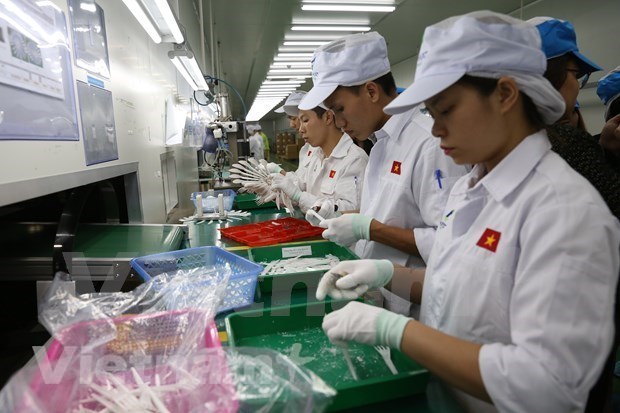ADB: Vietnam’s economy remains resilient despite challenges from COVID-19
 Production in a firm (Photo: VietnamPlus)
Production in a firm (Photo: VietnamPlus)Hanoi (VNA) – Experts of the Asian Development Bank (ADB) believe that Vietnam is showing stronger resilience than most similar economies and that its medium- to long-term economic outlook remains positive.
Vietnam’s economy is expected to grow 1.8 percent in 2020 amid the COVID-19 pandemic and bounce back to 6.3 percent in 2021, according to a ADB report released on September 15.
The Asian Development Outlook (ADO) 2020 Update, ADB’s annual flagship economic publication, says Vietnam’s economy will benefit from the continued diversion of production from China to Vietnam, and the implementation of the European Union – Vietnam free trade agreement. Slower-than-normal growth would keep inflation subdued at 3.3 percent in 2020 and 3.5 percent in 2021.
According to the report, domestic consumption is expected to remain weak. Despite recovery in retail sales in July and continuing moderate inflation, consumption will be held back by lower household and corporate incomes, rising unemployment, and more firms suspending operations. The prospect for investment is mixed, with private investment remaining weak and trade-related foreign investment continuing to slide.
“However, accelerated public investment in H2 2020 will offset these weaknesses. Looking ahead to 2021, investment will be boosted by improving disbursement of public investment, the continuing diversion of production from China to Vietnam, recovery in the Chinese economy, and the implementation of a trade agreement with the European Union to greatly liberalize trade,” it said.
The Japan External Trade Organization has released a list of 15 Japanese firms to shift their manufacturing from China to Vietnam. The majority of those moving to Vietnam make medical equipment while the rest produce semiconductors, phone components, air conditioners, or power modules.
Lending will likely remain weak despite central bank measures to support it. For their part, banks may be reluctant to relax lending standards to accommodate firms’ weaker balance sheets, fearing an increase in nonperforming loans when the deadline for loan restructuring expires. Credit demand from firms is falling as well, in tandem with weak demand for their products and services. Bank credit is therefore forecast to grow by only 10 percent this year, well below the central bank’s 14.0 percent annual target.
Unemployment is likely to keep rising. A joint study by the International Labour Organization and the Asian Development Bank projects that Vietnam will lose 548,000 jobs for youth if the pandemic is prolonged, and 370,000 jobs even if the outbreak is effectively contained.
The ABD experts said that Vietnam’s economic outlook in the near term is difficult, with the global economic downturn and domestic weakness proving worse than expected. However, Vietnam is showing stronger resilience than most comparable economies, and the economy’s outlook over the medium and long term remains positive. Economic fundamentals have not been impaired, and Vietnam looks likely to benefit from current trends in global patterns of trade, investment, and production.
“Lower domestic consumption and weak global demand caused by COVID-19 have hurt Vietnam’s economy more than expected. But economic growth will be resilient in 2020, in large part due to the government’s success in controlling the spread of COVID-19,” said ADB Country Director for Vietnam Andrew Jeffries.
Economic growth will be supported by the country’s macroeconomic stability, increased public spending, and ongoing reforms to improve the business environment, he added.
ADO 2020 Update says Vietnam’s economic outlook over the medium and long term remains positive. The country’s participation in a large number of bilateral and multilateral trade agreements will help the country’s economic rebound.
Vietnam will also likely benefit from the current shifting of supply chains to low-cost countries, it says.
However, a prolonged global COVID-19 pandemic remains the biggest risk to Vietnam’s growth outlook this year and next year, it notes, adding that another threat is global trade tensions, which lead to rising trade protection and financial risks that could be exacerbated by a prolonged pandemic./.













